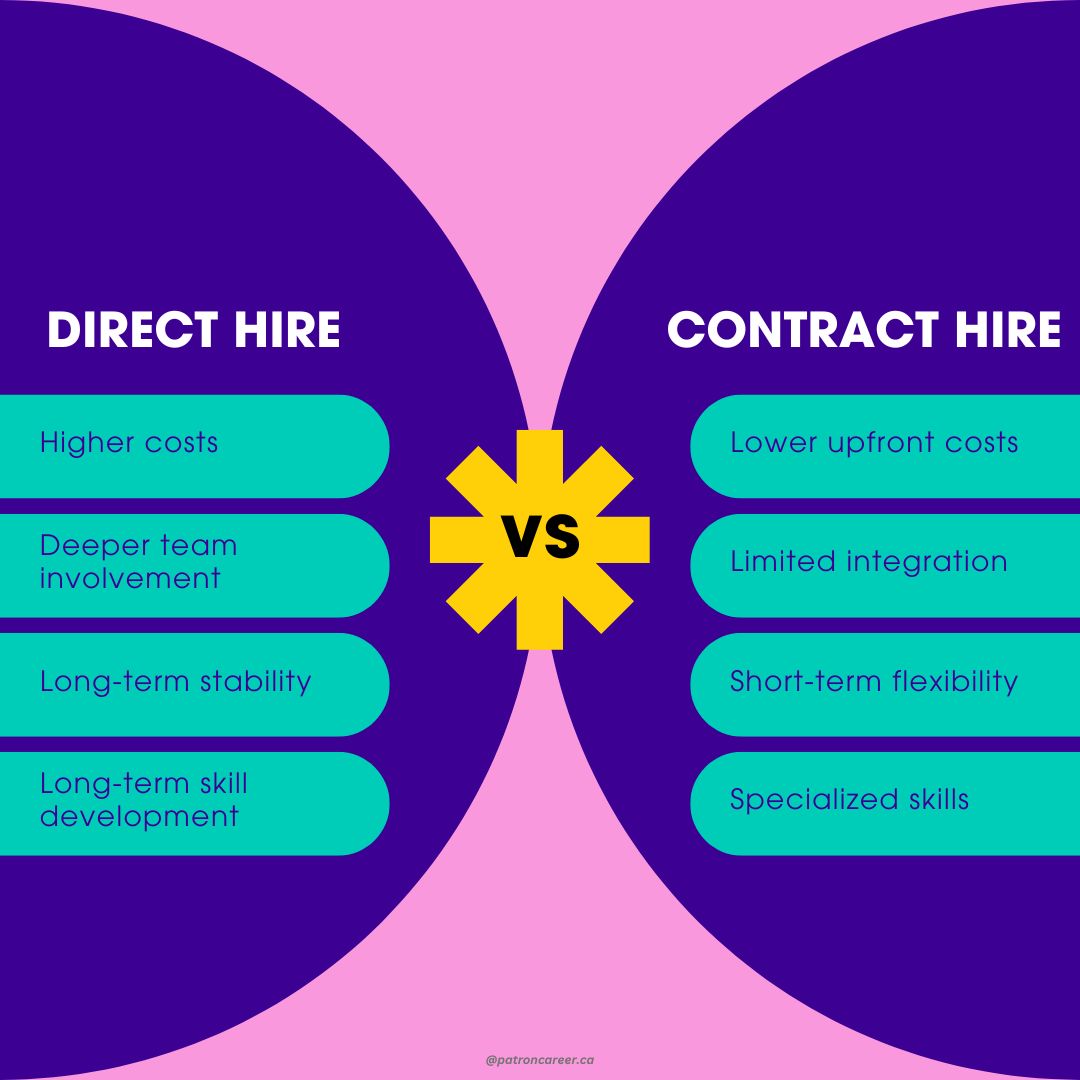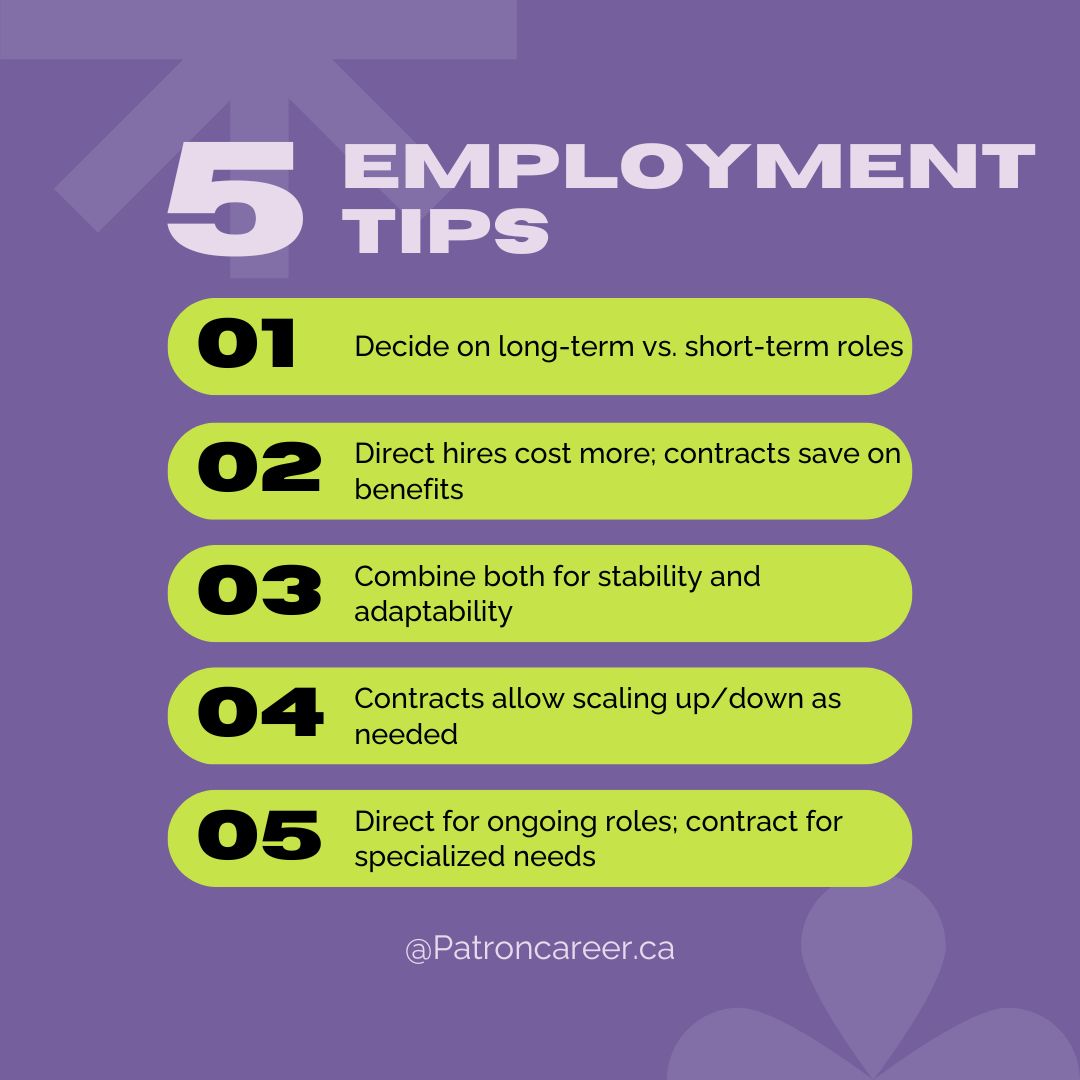Direct Hire vs. Contract Hire: A Guide to Making the Right Choice for Your Business
One of the fundamental choices every business faces day in and day out is choosing between direct hire and contract hire. As a business entity grows, so do its requirements for new employees. While you may turn to staffing agencies, knowing what will be the best for your business is a smart approach. With the right hiring model comes better workforce stability, cost management, and growth.
Let's examine the essentials of direct and contract hires and help you make an informed choice based on your unique business needs.
The Rudimentary Know-How: Direct Hire Vs. Contract Hire
A direct hire is when a company recruits a candidate as a permanent employee. Typically, this involves a more thorough selection process and a long-term commitment. The employee is on the company’s payroll, eligible for company benefits, and generally has greater stability within the organization.
On the other hand, Contract hires are temporary employees who work on a specific project or fill a role for a set period, usually ranging from a few months to a year. They’re often brought in through staffing agencies or as independent contractors. Contract hires typically don’t receive benefits from the company but may offer specialized skills for specific projects or seasonal needs.
Read Latest: How to Achieve a Sustainable Work-Life Balance?
Pros And Cons of Direct Hire
Pros
Understanding how you can benefit from hiring direct workers is quintessential for maintaining employee productivity and the company’s long-term growth:
- Long-Term Stability: Direct hires often bring stability and commitment. They are more likely to stay and grow within the company, becoming valuable contributors to the business culture.
- Greater Accountability: Permanent employees tend to take ownership of their roles, working toward long-term objectives and company goals.
- Enhanced Company Culture: A consistent, full-time team fosters a strong sense of unity and purpose, which can positively impact employee morale and engagement.
Cons
There are also a few downsides of the direct hiring model that must be kept in mind:
- Higher Upfront Costs: Direct hires come with expenses like benefits, insurance, and potential training costs, which can add to the overall hiring cost.
- Slower Hiring Process: Direct hires usually require extensive screening, interviewing, and background checks, making it a more time-consuming process.
- Fixed Payroll Obligations: Once hired, direct employees are a fixed cost on the payroll, regardless of seasonal fluctuations in workload or business demand.
Also Read: Workforce Planning for Large-Volume Employers
Pros and Cons of Contract Hire
Pros
- Cost-Effective: Contract hires often require lower upfront costs. Businesses typically don’t need to cover benefits and payroll expenses can be reduced by only hiring for short-term needs.
- Flexibility: Contract hires provide flexibility, allowing businesses to scale up or down as needed, without the commitments of a permanent hire.
- Access to Specialized Skills: Contract hires are often industry specialists or skilled professionals, making them ideal for roles that require unique expertise.
Cons
- Potential for High Turnover: Contract workers have less job security and commitment to the company, which can lead to higher turnover rates.
- Limited Team Integration: Contract hires are less likely to fully integrate with the company's culture or become deeply involved in long-term projects. This is mainly because they do not spend as much time as full-time employees.
- Variable Productivity: Some contract workers may not reach the same productivity levels as full-time employees, given their temporary nature and lessened alignment with the company's core objectives.
What Key Factors Should You Consider When Choosing Between Direct and Contract Hire?
Always weigh your options. Be mindful of your company’s needs, culture and goals before making a choice. Also, here are the important points to consider first:
1. Budget Constraints
Most companies operate on a strict budget when it comes to hiring. Direct hires come with significant costs, from benefits to potential relocation expenses. If your budget is limited, contract hires offer a cost-effective solution, as they typically don’t require benefits. Analyze your budget to see which hire type aligns best with your financial plan.
2. Project Length and Scope
Secondly, what you need to asses is the role requirements. For roles tied to a specific project with a defined end date, a contract hire may be a better fit. However, if the position is integral to ongoing operations, a direct hire is more suitable. Companies needing specific skill sets for temporary periods may find contract hires ideal, while those looking for sustained growth benefit more from direct hires.
3. Workforce Stability and Turnover
If your company is at a risk of high turnover disrupting your business, direct hires might provide the stability you need. Contract hires can fill seasonal roles or support short-term projects, but they may not align with companies requiring continuity and dedication.
Also Read: Temp V. Perm Jobs
Hybrid Approach: Leveraging Both Direct and Contract Hires
An intersection between the two models lies in adopting a hybrid approach. This is true for many huge corporate houses today and even many medium to small enterprises that get the best of both worlds. The hybrid model allows you to maintain stability by balancing permanent employees in essential roles with contractors for project-based needs. With a dedicated team of direct hires, you ensure consistency and cultural alignment within your company. By bringing in contract hires for specialized roles, a company can scale based on demand and access talent as needed.
Lastly
We understand how this choice can be a little hard at first. By evaluating your business needs fully, its mission, long-term goals and resources, you can effectively make the right choice for your business or even blend both direct and contract hires if it best suits your objectives.
Nevertheless, it’s always the right time to choose a staffing agency to take you through this comprehensive process. At Patron Career Staffing Agency, with our expertise, vast network, and personalized guidance, you can secure the right fit to help your business thrive.






